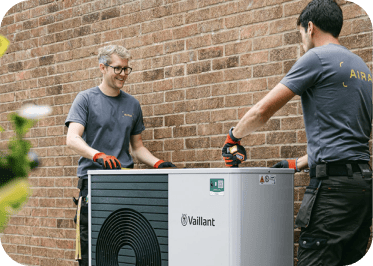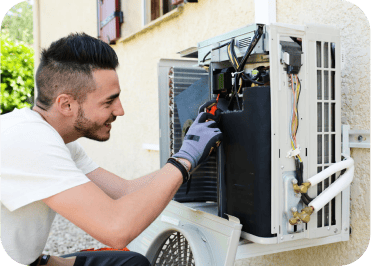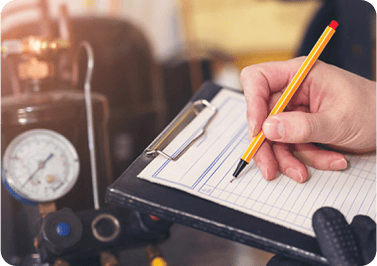Spot on, Reliable Services.
Providing Heating and Cooling Solutions for Your Home and Business
Servicing Toronto and the GTA
Services Tailored to your Needs
Why Choose Leopard HVAC?
Experience you trust, service you count on, and value you appreciate.

Repair
Furnaces, air conditioners, heat pumps, gas lines, underground gas lines, barbeque lines, hot water heaters, tankless hot water heaters, pool heaters, thermostats, ductwork, humidifiers
Learn More
Installation and Retrofit
Furnaces, air conditioners, ductless mini-split systmes, heat pumps, gas lines, underground gas lines, barbeque lines, hot water heaters, tankless hot water heaters, pool heaters, thermostats, ductwork, humidifiers, air purifiers.
Learn More
Maintenance
Furnace tune-up and inspection, air conditioning tune-up and cleaning, filter changes, hot water heater flush and inspection, smoke detector and carbon monoxide detector testing.
Learn MoreCaring For Your Space Is Our Expertise
At Leopard HVAC Services, we understand that comfort is key. With years of expertise, we deliver professional heating and cooling solutions tailored to your unique needs. Whether it's keeping your home cozy in winter or cool during the summer, we're dedicated to ensuring your spaces feel just right.
Our Story
Leopard HVAC Services was founded on the principle of providing reliable and efficient HVAC solutions to homeowners and businesses alike. With a commitment to quality and customer satisfaction, our team has grown into a trusted name in the industry. From humble beginnings to becoming a leader in HVAC services, our story is one of dedication, passion, and a relentless pursuit of excellence.
Our Objectives
At Leopard HVAC Services, our objectives are clear: deliver top-tier HVAC services, maintain energy-efficient systems, and provide unparalleled customer support. We aim to ensure that every client enjoys the perfect balance of temperature control, system reliability, and peace of mind, whether it's for residential or commercial needs.

Feedback About Their Experience With Us
Read testimonials from our satisfied clients. See how our maintenance services have made a difference in their lives and homes
Posted onTrustindex verifies that the original source of the review is Google. Fantastic service. Well priced. On time. Mission accomplished. Totally recommend.Posted onTrustindex verifies that the original source of the review is Google. Had a great experience. Michael was professional, he showed up on time, was upfront about pricing and he did a great job. Will reccomend and use again. Thank you LeopardPosted onTrustindex verifies that the original source of the review is Google. Fantastic experience! Solved my issues and very reasonably priced. Couldn't have asked for a better outcome.Posted onTrustindex verifies that the original source of the review is Google. Michael Gordon was highly recommended to me and his work on sourcing and replacing our specialized thermostat was excellent. Very knowledgeable team, going over and above at every step.
Our craftmanship is undeniable.
Our signature is your guarantee.
Frequently asked questions
We're here to help with any questions you have about plans, pricing, and supported features.
Workspace
& Site plans
We provide a full range of HVAC services, including installation, repair, and maintenance for heating, ventilation, and air conditioning systems. Whether you need a new system installed or an existing unit serviced, we’ve got you covered!
Many potential breakdowns can be prevented through routine maintenance. When
we inspect your HVAC equipment, we can identify failing and worn out components
before they stop your system. Additionally, we can identify and prevent future leaks
and other potential property damage.
Unusual noises: If you hear banging, grinding, or squealing sounds coming from your HVAC system, it could indicate mechanical issues like a loose part or motor failure.
Inconsistent temperatures: If certain areas of your home are warmer or cooler than others, or the system struggles to maintain a set temperature, it might need calibration or repairs.
Weak airflow: If air isn’t flowing strongly through your vents, it could be a sign of a clogged filter, ductwork issues, or a problem with the system’s blower.
Frequent cycling: If your system is turning on and off more frequently than usual (short cycling), it could indicate thermostat issues, overheating, or a malfunctioning component.
High energy bills: A sudden increase in your energy bills without a change in usage can be a sign your system isn’t working efficiently and may require repairs.
Odd odors: Foul smells coming from your HVAC system can signal mold, burnt wiring, or other issues that require immediate attention.
Excess humidity or dust: If your home feels more humid or dusty than usual, your HVAC system may not be properly filtering the air or regulating moisture levels.
Water leaks: If you notice water pooling around your HVAC unit, it could indicate a problem with the condensate line or other components.
We conduct a comprehensive evaluation of your equipment, including a thorough
inspection, operational and safety test, and cleaning as warranted. Any issues found during
our inspection will be brought to your attention.
Regular HVAC maintenance, ideally performed twice a year—once before the heating
season and once before the cooling season—helps prevent breakdowns, improves energy
efficiency, and extends the life of your system.
For more information click here
It’s generally recommended to have your HVAC system serviced twice a year:
- Once in the spring: Before the cooling season, to ensure your air conditioner or heat pump is ready for the warmer months.
- Once in the fall: Before the heating season, to make sure your furnace or heating system is functioning properly for the colder months.
Regular semi-annual maintenance helps catch potential issues early, improve energy efficiency, and prolong the life of your system. Additionally, regular servicing can ensure your system is operating safely, especially if you have gas-powered components like a furnace.
Maintaining your HVAC system between professional check-ups can help keep it running efficiently and extend its lifespan. Here are some simple maintenance tasks you can do on your own:
1. Regularly Change or Clean Air Filters
- Replace or clean air filters every 1-3 months, depending on your system and filter type. Dirty filters reduce airflow and force the system to work harder, leading to higher energy bills and potential damage.
2. Inspect and Clean Vents and Registers
- Check all vents and registers in your home to ensure they are free from obstructions like furniture or dust buildup. Clean them periodically to maintain good airflow and indoor air quality.
3. Keep the Outdoor Unit Clear
- Ensure the outdoor condenser unit is free from debris such as leaves, dirt, grass clippings, and snow. Trim nearby plants or bushes to allow at least 2 feet of space around the unit for proper airflow.
4. Check Thermostat Settings
- Regularly inspect your thermostat to make sure it’s working correctly and set to the appropriate temperature. If you have a programmable thermostat, adjust the settings seasonally to reduce energy consumption.
5. Monitor System Performance
- Pay attention to how your system is running. Listen for unusual noises, monitor the airflow, and check whether your home is maintaining consistent temperatures. Early detection of performance issues can prevent bigger problems.
6. Inspect the Drain Line
- Check the condensate drain line periodically for blockages. This line removes excess moisture from the system, and clogs can lead to leaks or water damage. You can clean it by flushing the line with a mixture of water and vinegar.
7. Keep Airflow Unobstructed
- Make sure there’s adequate space around your indoor and outdoor units to allow for proper airflow. Avoid placing anything on top of or too close to the HVAC equipment.
8. Check for Air Leaks
- Inspect your home’s doors, windows, and ductwork for any air leaks. Sealing gaps or adding insulation can reduce the strain on your HVAC system and improve energy efficiency.
9. Keep the Area Around the Furnace and AC Unit Clean
- For indoor units like furnaces or air handlers, ensure the area surrounding them is clean and free from clutter or dust. Avoid storing items near the units, as this can restrict airflow and present a fire hazard.
10. Monitor Your Energy Bills
- Keep an eye on your utility bills. If you notice an unexplained spike in energy usage, it could be a sign your HVAC system is not operating efficiently and may need attention.
By performing these simple tasks, you can help ensure your HVAC system stays in good condition between professional check-ups.
The ideal thermostat setting depends on the season and your personal comfort preferences, but here are some general guidelines for both energy efficiency and comfort:
In Summer:
- When you’re home: Set your thermostat to around 78°F (26°C). This strikes a good balance between comfort and energy savings.
- When you’re away: Raise the temperature to around 85°F (29-30°C) or higher to conserve energy while you’re not home.
In Winter:
- When you’re home: Set your thermostat to around 68°F (20°C). You can wear warmer clothing to maintain comfort without overworking your heating system.
- When you’re away or asleep: Lower the temperature to 60-65°F (15-18°C) to save energy.
Additional Tips:
- Use a programmable or smart thermostat: This allows you to automatically adjust the temperature based on your schedule. You can program it to lower or raise the temperature when you’re away or asleep, and it will return to a comfortable level before you get home or wake up.
- Avoid extreme temperature settings: Cranking the temperature too high or low doesn’t speed up heating or cooling; it only makes the system work harder and less efficiently.
Following these guidelines can help you maintain comfort while optimizing your HVAC system’s efficiency and reducing energy costs.
Contact info
Keep In Touch
We prioritize responding to your inquiries promptly to ensure you receive the assistance you need in a timely manner
Find us
Call Us
(437)-422-3400
info@leopardhvac.com
Address
Servicing Toronto and the GTA

